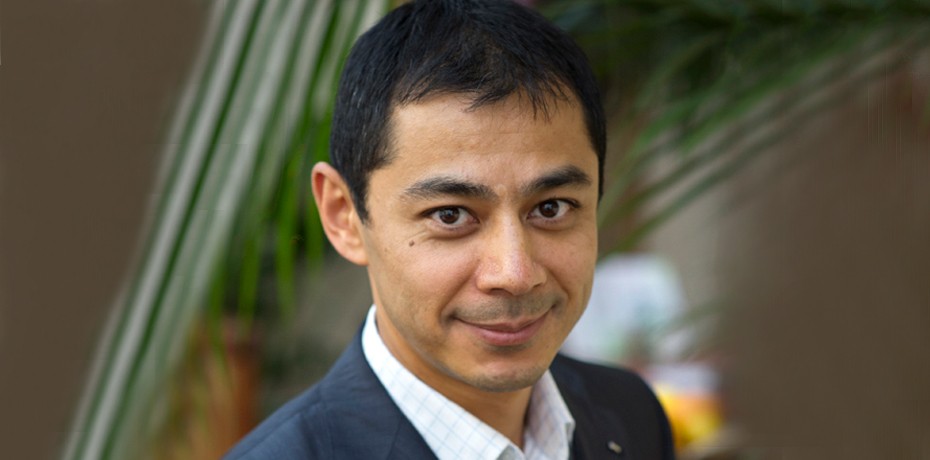-

David Young
17:30 | 09.04.09 | Interviews | 10704
“If there is real wish, there will be result as well”
Interview of David Young, Chairman of ABBYY Company’s Board of Directors, to Mediamax Agency and Itel.am portal
David Young is the Chairman of ABBYY Company’s Board of Directors, a Company, which has elaborated programs, such as Lingvo and FineReader. Today, 128 Lingvo dictionaries in 10 language directions function in 138 countries of the world, and each second scanner in the world is equipped by FineReader text recognition program.
David Young was born on June 3, 1968, in Yerevan. In 1992, he graduated from the Faculty of General and Applied Physics of Moscow Institute of Physics and Technology (MIPT). Fourth year student of MIPT, David founded his first company – BIT Software, which was later on renamed into ABBYY.
David Young is one of the founders of “Ayb” Club and Educational Foundation, which plans to set up Ayb Learning Hub (ALH) in Yerevan.
David Young agreed to talk to Mediamax about the prospects of IT in Armenia.
- Despite the fact that already for 10 years IT sphere has been considered a priority in Armenia, one can hardly describe the real results as impressive. And in the Global Economic Forum’s (GEF) recent Annual Global Report on Information Technologies, Armenia occupied 114th place among 134 countries in the “Networked Readiness Index”. What should be done to shift from words to actions and really develop IT in Armenia?
- Russia, by the way, occupied the 74th place in the given report, yielding to Kazakhstan, Ukraine and Baltic States. This, of course, is better than 114th place, but for a country, such as Russia, this is a shameful index. So, the problems are similar.
What should be done? A few days ago, I met with Arkady Dvorkovich, Assistant to the Russian President. We discussed IT prospects for the nearest 10-20 years, issues on what the place of Russia can be in the global division of labor, and what the government should to make Russia a global innovation power. I believe that the answers, which were voiced, may be to a significant extent applicable for Armenia as well.
During my meeting with Dvorkovich, I presented a report, which was composed basing on analysis of the so-called “hit-parades” of technologies of future - special analytical reports, prepared by famous institutions and media structures. Russia and Armenia have a real chance to occupy their deserved place in the global division of labor. There is chance to establish bases for innovations. According to experts, in the nearest 10-20 years our world will undergo fundamental changes due to genomics - study of human genomes. This work is 80% carried out within the sphere of IT, artificial intelligence. Armenia may set itself a goal and start investing in training and education in the given sphere, invite teachers, secure establishment of a few laboratories with invited professors. There are many Armenians by origin, who deal with genomics in different centers in the world. They should be invited and conditions for work should be secured: this may become a starting point for growth and consolidation.
Another promising and revolutionary direction is the so-called cloud computing: convergence of various hardware and software platforms, when not 10-50 or 100-200 engineers work on one application – in the view of administrative and technology limitations, but dozens of thousand people. They can be divided as to areas, working in different programming languages and platforms. This will also change the landscape of future applications and services. Here Armenia may also make its contribution and get involved in what will be taking place in the world within the nearest 15-20 years.
- Does this mean that IT cannot develop without a proper level of scientific-research developments?
- One can develop also the purely engineering, applied part. This may become a short-term and speedy development. But if we think, setting ourselves a target for 20 years, we will not be limited to purely applied tasks. Scientific research does not have to be super-fundamental. One does not need to build colliders, costing billions of dollars.
The issues of scientific and engineering school, the teaching staff and strong students: all these things are interrelated. When we discussed these issues with Dvorkovich, they were discussed in wider context: very strong students are needed for strong IT and engineering school, and they, in their turn, need strong teachers. Strong teachers, as a rule, are involved in their own research. We can see this from the example of the same Massachusetts Institute of Technology and other top higher educational institutions of the world, where teachers work on their developments right in the university, and a strong school is built around that.
There was a strong school in Armenia once, but both Armenia and Russia experience a serious crisis at present, related to ageing of personnel and the generation gap. By no means all representatives of the old school, within the age range of 65-75 years, are skilled in modern technologies, and the majority of young teachers work abroad. This is a very serious problem.
- In Armenia, popular is the opinion, according to which priority development of IT is impossible without tax privileges. What is your opinion concerning this?
- It is really important. If you try to convince investors of the fact that works should be carried out exactly in Armenia, and then it turns out that the social and salary taxes in Armenia in the given sphere are high, it will be significantly more difficult to find investments of course. In innovation and IT spheres, 50-70% of the expenses fall on the share of salaries for people, and the social and salary taxes in fact become taxes from the company’s turnover. It is absolutely true that this issue should be solved. But this is only part of the problem. If the tax load is lightened, but the issues of education are not solved, this will mean that nothing is done.
- Can “Ayb” foundation play its role in developing IT in Armenia?
- We started from the very beginning - secondary education. But we, of course, cannot do everything alone. Yes, we believe that we will be able to become an example for other education projects. But, all the same, we will not be able to substitute state’s undertakings in the sphere of education. We thought about organizing special courses for higher educational institutions, but it is an issue of future.
There should be the understanding that teachers, students and investors are needed for a good innovation environment. Everything should be put together as a “puzzle”, one should not solve only one problem. One can take the very successful examples of Israel or Finland; the starting points in those countries were once comparable to today’s situation in Armenia. They have already managed in the course of 20-30 years to become countries with strongest innovation and technology industries. Armenia has always been famous for its talents. This is the resource and the part of the “puzzle”, which cannot be bought for any money. And the remaining parts of that “puzzle” will appear, if one takes the solution of the issue seriously. If there is real wish, there will be result as well.

17:29 | 24.09.25 | Articles
Jacopo Losso on Cross-Border Investments and Why Armenia Attracts Angels








